Xinyi Zhang
Let’s start with a story, which I saw on a public number. The wealthy mother spent money to buy her daughter a 300,000 yuan shop, but her daughter was ungrateful and didn’t shop all day. She doesn’t study, she doesn’t lose weight, she doesn’t even look at the shop, and she is keen on talking about her boyfriend who is useless to outsiders. Mother went online for help and wrote down the facts themselves.
Such a story sounds simple and boring, even as creative material, it seems that there is not much room for imagination.
However, the mother-daughter story, ordinary life, secret inner corner, and life that is stipulated and arranged are all potential elements that can be described in this story. Is the daughter really happy or seemingly rebellious? What is she expecting? What is the dislocation between her expectation and her mother’s expectation? There will be other shops in the same street. What is the biggest difference between the daughter who became the boss in her early twenties and other middle-aged women who became the proprietress through marriage?
Women’s roles can be confined to private space. The water towns, alleys and ancient towns in the south of the Yangtze River are some familiar narratives that originated from contemporary literature in the 1980s. You can also enter the workplace. The images of professional women in Hong Kong film and television in the 1990s, such as "Sister Tuo Gun", "No.1 Imperial Court" and "Wonderful Hands and Kindness", have shaped most of our generation’s life imagination in professional fields, work ability and romantic urban love. However, only longing does not resonate, because it is not realistic. The details of life should be broken down, such as the long scenes in Hou Hsiao-hsien’s movies when recalling the past, and the endless meals in Xu Anhua Tin Shui Wai day and night. Focusing on specific individuals, we discuss the situation in which women enter the public sphere from private space, and then wander between them to find their own position.
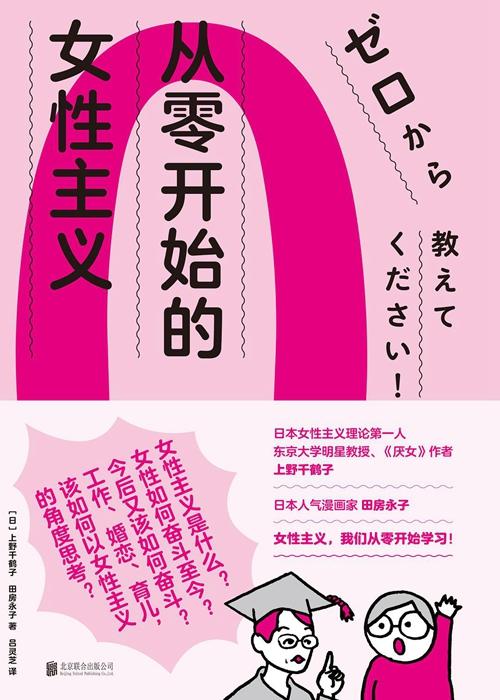
Feminism from scratch, written by Chizuko Ueno and Yoko Tanaka on [Japan], translated by Lu Lingzhi, Beijing United Publishing Company, September 2021.
Chizuko Ueno’s new book, with its title, cover design and dialogue style, is closer to the popularization of popular science. It is placed after her previous publication "Misogyny" and "Patriarchy and Capitalism", which is in line with the title "Starting from scratch" and is similar to some metaphor. Although we have taken some steps, the complexity of reality will require us to return to the original point at any time. This is a proposition of collective environment and a strategy to understand individual situation.
Starting from zero, the starting point of zero varies from person to person. We need to know concretely and constantly before we can start our reflection. It is more difficult to understand and act in the field of practice. However, if you are lucky enough to be a creator at the same time, you will have another mission-narration. It will add an angle to help you inspire greater understanding and empathy.
Cognition: "disobedience" under structure
Patriarchy and Capitalism by Ueno Chizuko is not only an introductory reading to introduce the theoretical basis and limitations of Marxism, but also an extension of it. It uses several concepts to explain the dilemma of women being under the family structure and social structure at the same time. "Love" and "motherhood" are constructed myths, and the actual situation is the hidden economic and power structure: the contradiction between production and reproduction, "housework" from the dual perspective of patriarchy and capitalism, the trap of "interruption-re-employment" and so on.
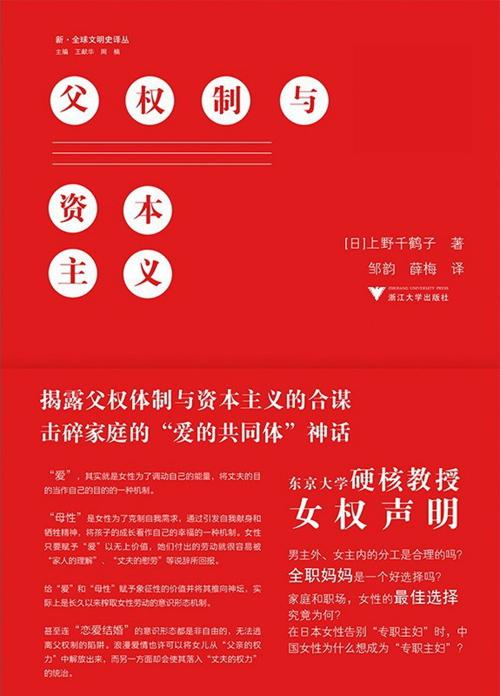
Patriarchy and Capitalism, by Ueno Chizuko, translated by Zou Yun and Xue Mei, Zhejiang University Press, March 2020.
Some of the habits of writing with articles while reading will become unintelligible sighs when they reread. Rereading Patriarchy and Capitalism, I saw that I was full of expressions such as "I want to see hope" and disappeared at the back of the book. In the concrete development of reality, the old explanatory terms show their growing limitations. Facing the fresh and more complicated realistic dilemma, we need new languages.
This is, of course, a great significance of "female writing". "Female writing" and "female narration" are undoubtedly not rigorous enough in academic expression, but its significance lies in being named itself. We hardly talk about "male writing", but emphasize "female" from the gender dimension, which lies in the necessity of gathering eyes. "We don’t want to turn our backs on each other, we are the injured whole." What Jane Austen blurted out through the protagonist’s mouth in northanger abbey is largely the author’s own voice. Under the structural conventions and restrictions, "female narration" of various art categories will be placed on the cultural edge. The expression of individual experience outside the mainstream narrative will be defined as an "autobiography" that is not decent enough or a trivial narrative. The heart and voice that have been neglected for a long time will be covered by another way of interpretation, such as narrow life, defects in works, rebellion against self and so on. The emerging "female role model" has also become isolated. While we praise her, we praise an isolated and talented individual who has grown up, and we can’t see the possibility of changing the fate of the group.
"Obey", we will continue to stay in the original structure and language expression. Those ways of explaining life make us feel safe, easy and easy to resonate, but they just bypass the protagonist as the main body. A mother with a traditional concept understands her daughter in the old structural cognition, and her daughter will undoubtedly be condemned. My daughter has a "correct" life template in the old structure, which is related to losing weight, becoming beautiful, finding a "reliable" male protector, watching the shop and so on. But in her daughter’s mind, will she define her life outlook and individual value in this way in her early twenties? Her rich, subtle and secret feelings, her curiosity about the world and her desire for love have thus entered a stable track, past, present and future, and the established rules and expectations … As a specific individual, her daughter refused such a narrative.
Imagination: Focus on specific individuals.
"disobedience" will cause the fear of the original power subject. "How to restrain women’s writing" writes about the ridicule and doubts suffered by "women’s writing" in various eras.
"Let them fear is not a stranger. It is a reinterpretation of familiar things. " "Women writers broke into the canon again and again, out of nowhere-they are unusual and maverick, their writing techniques are weird, and their ideas are’ out of date’".
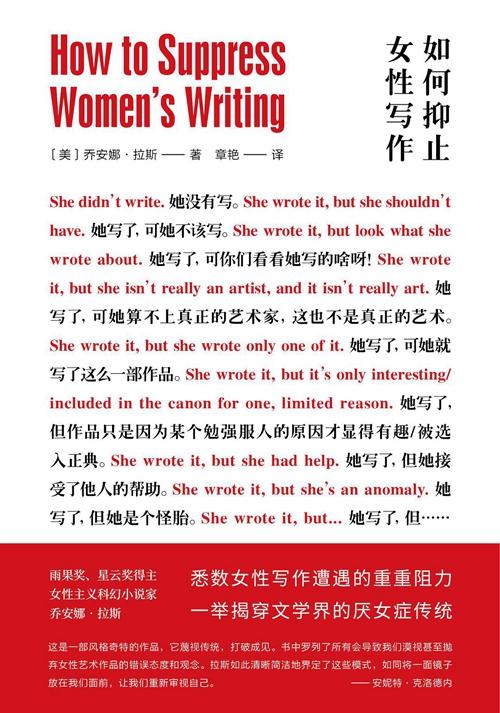
How to restrain women’s writing, by Joanna Lars, translated by Zhang Yan, Nanjing University Press, November 2020.
Its anachronism comes from two levels. First, in narrative skills, in the empirical world defined by male theme discourse, the interpretation from the female perspective challenges the so-called objectivity and absolute standards. Once the existence of "the other" art itself is recognized, the linear hierarchy, order and standards need to be redefined. Second, in the narrative experience, in the field where "they" have expressed, "they" have made a new sound, which has the structural vibration force that the positions of "center" and "edge" are constructed. To what extent can the heterogeneous experience expressed by female narration be understood and accepted? The essence of expression lies in confirming the existence of experience and calling for the possibility of new historical construction.
As a means, narration is the expression of experience. However, within the female group, how to treat their own experience is also undergoing a process of change and development. The reflection of "misogyny" exists not only in the structure of gender opposition or social economy, but also in the internal development and cognition of women, which involves the part with the most imaginative space besides rationality, that is, people’s subtle and rich inner world.
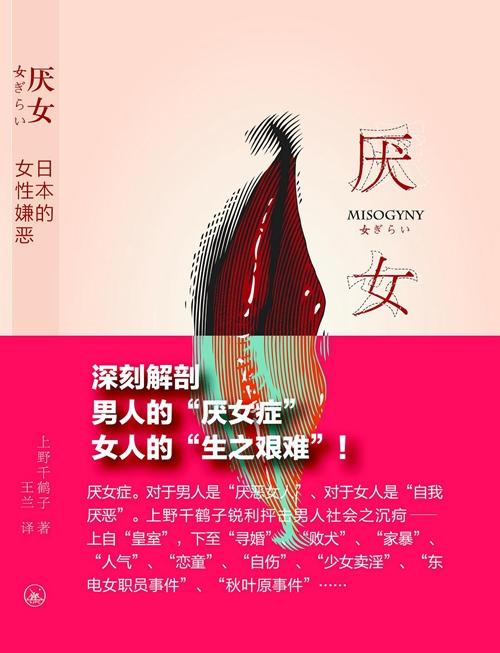
Misogyny, by Ueno Chizuko, translated by Wang Lan, Shanghai Sanlian Bookstore, January 2015.
As a novel-writing enthusiast who thinks that she has written female stories, I also began to find the ghost of "misogyny" in myself from reading "misogyny". If I write this story, there is a high probability that I will write a story about a successful startup. One is to spend a lot of energy to prove her daughter to her mother, and the other is a mother who can’t understand that her daughter finally chooses staged reconciliation. There is obviously some kind of template behind such a story. For example, even in such a close relationship between mother and daughter, we need social wealth and status to prove our value. This is the "canonical" evaluation standard under the structure of patriarchy and capitalism. Realism, but lacking vivid details, is written "truth". The portrayal of characters is nothing to be desired.
Maybe the daughter is a daughter who can’t become a female entrepreneur. Maybe the mother’s judgment is right. She has no talent and is wasting her time. Such a narrative will be trapped in the meaning of the commonplace, so why should we tell and appreciate it?
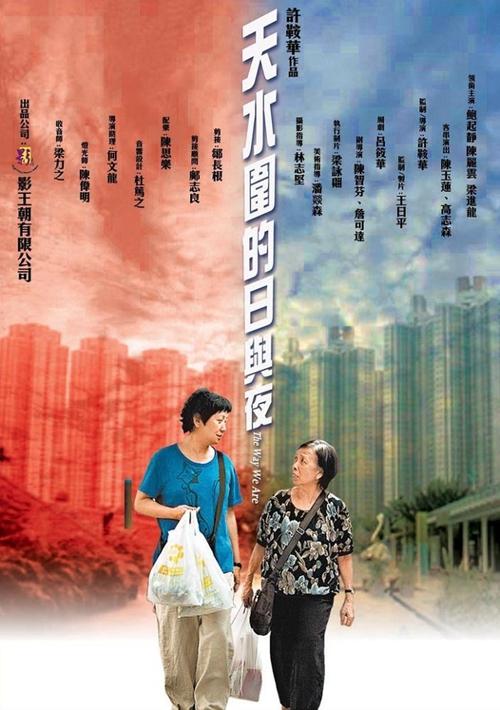
Movie poster of Days and Nights in Tin Shui Wai
And if this is a movie, shoot the daily life of mother and daughter. Eating, washing dishes and sleeping, my daughter secretly went out for a date, and my mother was alone in the deserted shop. It was dull, boring and unintelligible at some moments. Suddenly, I would think of a certain narrative style of Xu Anhua, Days and Nights in Tin Shui Wai, Sister Tao and Forty Women. Recently, the documentary film "Make a Good Movie" about Xu Anhua was released. Taking this opportunity, I revisited many works by Xu Anhua. The female images she created, such as Zhang Mu, Grandma Liang, Tao Jie and A E in Tianshuiwei, are all individuals who have worked hard in concrete life. Buy food, eat, wash dishes, deal with relatives and friends, and then continue to buy food, eat, wash dishes and solve all kinds of troubles in the family. They are faced with specific dilemmas: husbands who don’t care about things, silent sons, complicated housework, and fathers-in-law with Alzheimer’s disease … They don’t have such luck. Like the heroine in Escape is shameful but useful, they clearly mark the price and get salary feedback from their employers/male parents. In Ueno Chizuko’s analytical framework, they are individuals who have never awakened and reflected on their thoughts. They are kind and hard-working, swearing and stumbling to take responsibility.
What we have to do is not to condemn and take sides. Starting from "zero", we have experienced the long efforts of women’s power fighters in past dynasties. The reproduction mode in family structure is to try to answer the reasons why women feel uncomfortable in family life. The self-discovery of "misogyny" is a precious turning point. Every one of us has more or less "misogyny", and feminists start to think from it, which makes us focus on the part that is disciplined in a subtle way. Writing is a kind of expression. Let’s let our imagination fly. The expression of experience has many forms.
Only a part of individuals can be understood by theoretical analysis, and the more important part focuses on real and rich life experiences. How can women find their own value under different circumstances?
Narration will come to an abrupt end here, and the interpretation framework and story template will be invalid. For example, we need more imagination to understand the story of this mother, daughter and shop. Life tells a story, the logic is rigorous, but the facts are ever-changing. The premise is a deeper understanding and empathy, not only as a listener and storyteller, but as a member of the group. The value that the mother thinks, the value that the daughter yearns for, and the value that the daughter can achieve in the current situation are all misplaced scripts that need to be rewritten in many details. It is a good thing to come to an abrupt end. In the face of new and more complicated practical difficulties, we need new languages.
Narration: We are a whole.
The sincerity of narration requires us to enter the individual’s life experience and spiritual world. However, in the meaning behind narration, it may be of special significance to connect individuals and become a whole. In Make a Good Movie, except for the actress, almost all of Xu Anhua’s colleagues are male directors, so the narrative of the documentary about the director himself cannot be separated from the gender issue. When Xu Anhua finishes a film and publicizes it all over the country, she will also be expected to make such a narrative. As a female director, what do you think is special in all aspects?
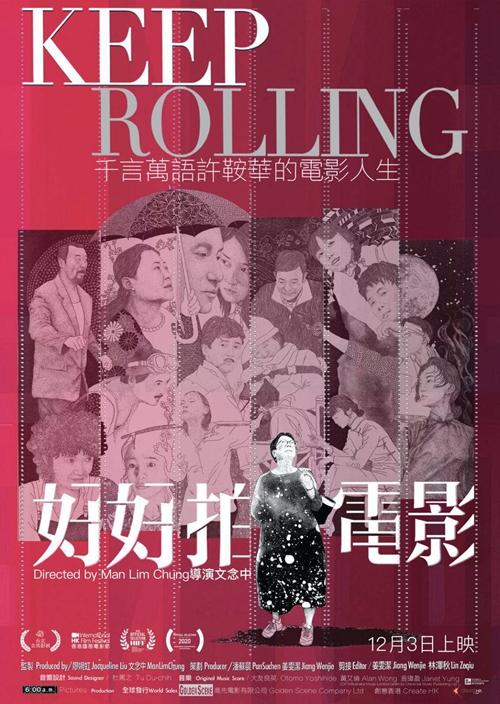
Poster of documentary "Make a Good Movie"
In the analysis of How to Restrain Women’s Writing, "deprivation of authorship" has gone through a long process of development. After acknowledging the existence and rationality of writing-she is writing, she should write, and she writes well. There is also a part that is embarrassing-where did "she" come from?
She is not an individual, not a genius, not an alternative, she is a member of the group. The context of women’s writing needs to be connected, and its logic is the discovery of role models, the combing of artistic traditions and the affirmation of historical achievements. Women’s narrative and voice need to leave results, which are the traces of "we" trying to live.
In How to Restrain Female Writing, it seems to talk about a very small part-female creators, but in fact they can be regarded as individuals who are temporarily separated from the myth of motherhood, family structure and reproduction distribution. The expression of individual experience, beyond the despair of "Jin Zhiying", opens up a new track for us-paying close attention to ourselves as much as any specific problem. Its greatest significance lies in the completion of behavior. When we say it, we say it, and when we write it, we write it. The opportunity of women’s writing and its recognized space did not fall from the sky, but it took a long time and the efforts of several generations.
Where did she come from? Xu Anhua is not an exception. Make a Good Movie disenchanted her. No matter how excellent she is, her most appropriate identity is still a sincere expresser. On the one hand, from the perspective of image nourishment or literature reserve, she has her own learning context and field role models, among which, of course, there are female role models, such as Zhang Ailing, whom she has repeatedly mentioned. On the other hand, she entered "their" life from the perspective of "people", which was a stiff and even awkward warmth, a way of explaining and trying to understand.
"Obedience" is the least imaginative. What it lacks is that the story of "Jin Zhiying" is not endless, and it causes fear, not resonance. Life’s refusal to discipline and self-exploration must always be a conscious act. In this sense, the seemingly useless daughter in her early twenties has ignited a flame that can become the light of reflection in the future. For girls in their early twenties, falling in love is a serious matter, not looking at the shop. The mother thinks that the value of her daughter is so single, and her daughter may not think so. At least, she didn’t lose weight and resisted the anxiety of appearance. She just likes a handsome, useless and not so serious boyfriend, which is understandable.
"Obedience" will stifle the imagination of life, and the specific way is the practice of individual experience. Therefore, after reading all kinds of theories, we still have to mistake the daily petals for the rare snowflakes in the south, like the ignorant "father-in-law" in Forty Women, and imagine that we are standing in the snow all over the sky, and there is such an epiphany moment that "life is very enjoyable".
Editor in charge: Fang Xiaoyan
Proofreading: Zhang Liangliang
关于作者